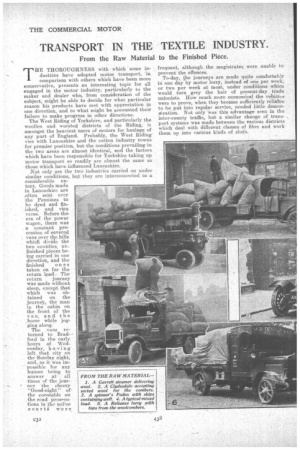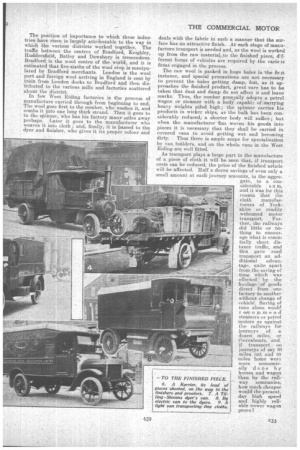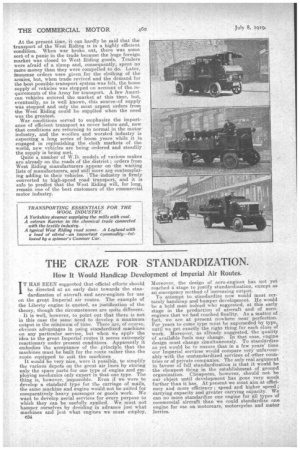TRANSPORT IN THE TEXTILE INDUSTRY.
Page 10

Page 11

Page 12

If you've noticed an error in this article please click here to report it so we can fix it.
From the Raw Material to the Finished Piece.
HE THOROUGHNESS with which some in dustries have adopted motor transport, in comparison with others which have been more conservative, presents an interesting topic for all engaged in the motor industry, particularly to the maker and dealer who, from consideration of the subject, might be able to decide for what particular reason his products have met with appreciation in one direction, and to what might be accounted their failure to make progress in other directions.
The West Riding of Yorkshire, and particularly the woollen and worsted districts of the Riding, is amongst the heaviest users of motors for haulage of Any part of England. Probably, the West Riding vies with Lancashire and the cotton industry towns for premier position, but the conditions prevailing in the two areas are almost identical, and the factors which have been responsible for Yorkshire taking up motor transport so readily are almost the same as those which have influenced Lancashire.
• a constant procession of covered vans over the hills whicfi divide the two counties, unfinished pieces being carried in one direction, and the finished on es taken on for the return load.The return journey was made without sleep, except that which was obtained on the journey, the man in the cabin on the front of the van, and the . horse while jogging along.
The vans returned to Bradford in the early hours of Wednesday, baying left that city on the Sunday night, and, as it was impossible for any human being to answer at all times of the jour ... riev the cheery "Good-night" of\ the constable on the road prosecutions in the nolice court i were frequent, although the magistrates were unable to prevent the offences.
To-day, the journeys are made quite comfortably in one day by motor lorry, instead of one per week, or two per week at most, under conditions whicti would turn grey the hair of present-day trade unionists. How much more economical the vehicles were to prove, when they became sufficiently reliable to be put into regular service, needed little demon ration. Not only Was this advantage seen in the inter-county traffic, but a similar change of trans, port systems was made between the various districts which deal with different classes of fibre and work them up into various kinds of cloth. The position of importance to which these industries have risen is largely attributable to the way in which the various districts worked together. The traffic between the centres of Bradford, Keighley, Huddersfield, Batley and Dewsbury is tremendous. Bradford is the wool centre of the world, and it is estimated that five-sixths of the wool crop is manipulated by Bradford merchants. London is the wool port and foreign wool arriving in England is sent by train from London docks to Bradford and then distributed to the various mills and factories scattered about the district.
In few West Riding factories is the process of manufacture carried through from beginning to end. The wool goes first to the comber, who washes it, and combs it, into one long thick strand. Then it goes to to the spinner, who has his factory many iniiles away perhaps. Later it goes to the manufacturer who weaves it into cloth and, finally, it is ..passed to the dyer and finisher, who gives it its proper colour and
deals with the fabric in such a manner that the surface has an attractive finish. At each stage of manufacture transport is needed and, as the wool is worked up from the raw material to the finished piece, dfferent forms of vehicles are required by the vario firms engaged in the process.
The raw wool is packed in huge bales in -the fir3t instance, and special precautions are not necessary to prevent the bales getting damp, but, as it approaches the finished product, great 'care has to be taken that dust and damp do not affect it and leave marks. Thus, the comber generally adopts a petrol wagon or steaaner with a body capabl3 of carrying heavy weights piled high ; the spinner carries his products in wicker skips, as the bulk has been considerably reduced; a shorter body will suffice ; but when themanufacturer as woven his goods into pieces it is necessary that they shall be carried in covered vans to avoid getting wet and becoming dirty. Thus there is ample scope for specialization by van, builders, and on the whole vans in the West Riding are well fitted.
As transport plays a large part in the manufacture of a piece of cloth it will be seen that, if transport costs can be reduced, the price of the finished article will be affected. Half a dozen savings of even only a small amount at each journey amounts, in the aggregate, to a considerable s u m, and it was for this reason that the
cloth manufacturers of Yorkshire so readily welcomed motor transport. Further, the railways did little or nothing to encourage what is essentially short distance traffic, and this gave road transport an additional advantage, quite apart from the saving o time which was effected by the haulage of goods direct from one Factory to another without change of vehiel6. Saving of time alone would reacoiximend steamers or petrol motors as against the railways for journeys of a dozen miles, or thereabouts, and. if transport on journeys of say 30 miles out and sO
miles home were more economic
ally -done by
horses and wagon than by the railway companies, how much cheaper
would he presentday high speed and highly reliable power wagon p-rov e ?
At the present time, it can hardly be said that the transport of the West Riding is in a highly efficient condition. When war broke out, there was some sort of a panic in the trade because the huge foreign market was closed to West Riding goods. Traders were afraid of a slump and, consequently, spent no more money than they were compelled to do. Later, immense orders were given for the clothing of the armies, but, when trade revived and the demand for the best possible transport system was felt, the home supply of vehicles was stopped on account of the requirements of the Army for transport. A few American vehicles entered the market at this time, but, eventually, as is well known, this source of supply was stopped and only the most urgent orders from the West Riding could be supplied when the need was the greatest. War conditions served to emphasize the importance of efficient transport as never before and, now that conditions are returning to normal in the motor industry, and the woollen and worsted industry is expecting a long series of boom years while it ia engaged in replenishing the cloth markets of the world, new vehicles are being ordered and steadily the supply is being met. , Quite a number of W.D. models of various makes are already on the roads of the district ; orders from West Riding manufacturers appear on the waiting lists of manufacturers and still more are contemplating adding to their vehicles. The industry is firmly converted to high-speed road transport, and it is safe to predict that the West Riding will, for long, remain one of the best customers of the commercial motor industry.






















